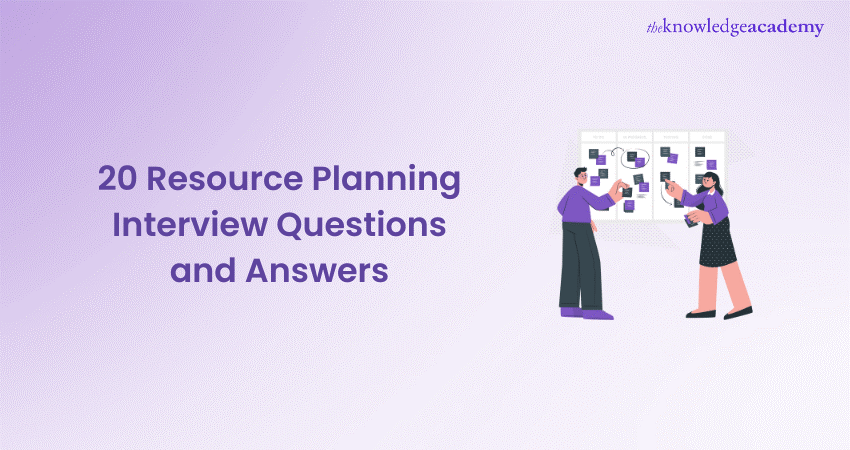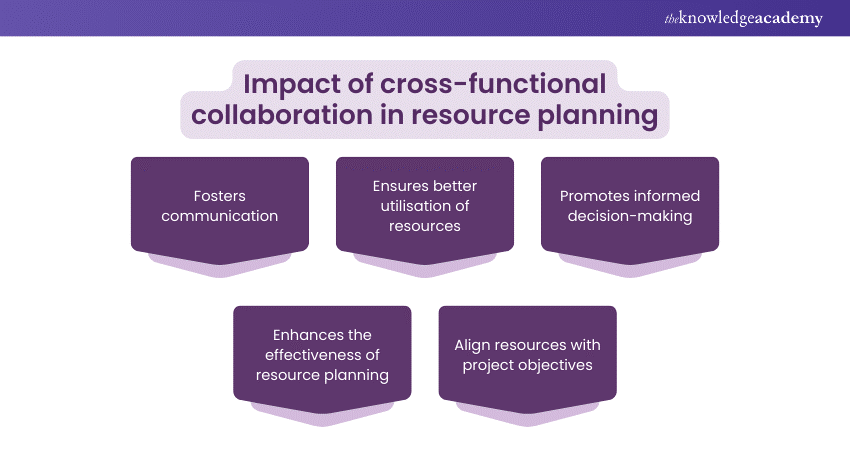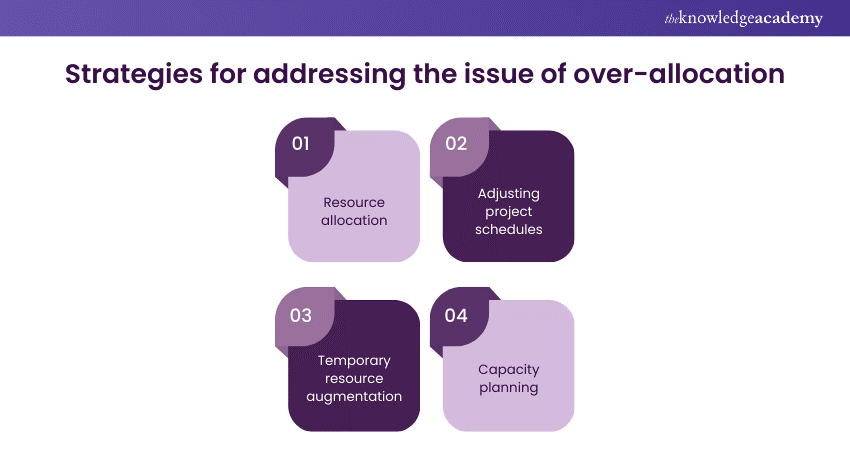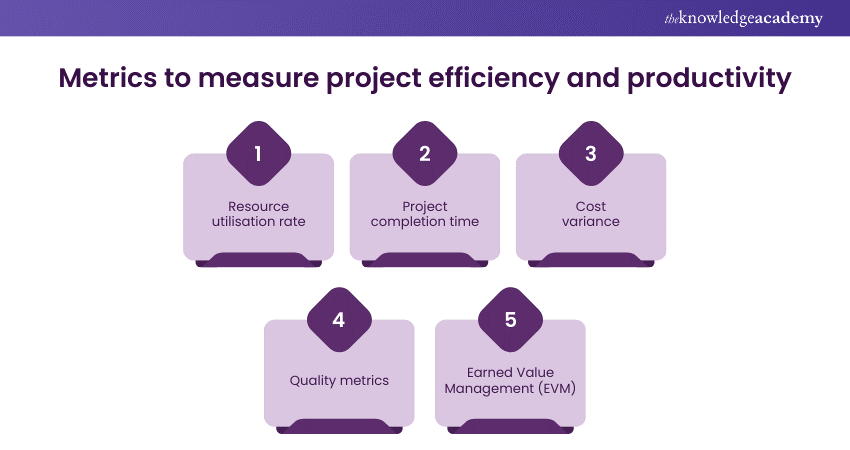We may not have the course you’re looking for. If you enquire or give us a call on +1 7204454674 and speak to our training experts, we may still be able to help with your training requirements.
Training Outcomes Within Your Budget!
We ensure quality, budget-alignment, and timely delivery by our expert instructors.

Resource Planning becomes increasingly pivotal when organisations strive to optimise their operations and maximise efficiency. But excelling in this job requires a deep understanding of project dynamics and resource constraints. Aspiring Project Managers must strongly equip themselves with the tactics to answer Resource Planning Interview Questions.
In this blog, we will embark on a comprehensive exploration of 25 Resource Planning Interview Questions and answers. Through detailed explanations and practical insights, budding individuals can gain valuable knowledge and sharpen their Resource Planning acumen. Let's dive in to unravel the complexities of Resource Planning and comprehend the techniques to excel in project management.
Table of Contents
1) Resource Planning Interview Questions
2) Beginner level interview questions for Resource Planning
3) Intermediate level interview questions for Resource Planning
4) Advanced level Resource Planning Interview Questions
5) Conclusion
Resource Planning Interview Questions
Resource Planning serves as the backbone of effective project management. Hence, the Resource Planning Interview Questions span a spectrum of topics, ranging from fundamental concepts to advanced strategies. Candidates are also tested on their ability to address common challenges in Resource Planning, like over-allocation, conflicting priorities, and resource constraints.
Moreover, such interview questions allow candidates to showcase their expertise in Resource Planning. In addition, they can highlight their achievements and lessons learned in previous roles.
Beginner level interview questions for Resource Planning
Beginner-level interview questions typically focus on your background, education, and general experiences. They provide an opportunity for you to introduce yourself and demonstrate your communication skills and enthusiasm for the role. Let’s talk about some basic Resource Planning Interview Questions:
1) What is Resource Planning?
This question aims to assess the candidate's understanding of Resource Planning in project management. It encompasses identifying project requirements and adjusting plans as needed.
Sample answer: Resource Planning specifically ensures the best use of resources, and their effective usage is the key to the project’s success. It includes multiple tasks like project requirements, prioritising tasks, and monitoring resources uptake to be efficiently used for achieving project objective.
2) What are some common challenges faced by a Resource Planner?
This question explores the candidate's awareness of common challenges encountered in Resource Planning roles. Common challenges faced by resource planners include resource allocation conflicts, insufficient data for planning, changing project requirements, and managing stakeholder expectations. Resource planners must navigate these challenges effectively to ensure smooth project execution and delivery.
Sample answer: One of the many obstacles that arise while making a schedule includes resource allocation conflicts since the needs and choices of multiple projects compete for the same resources. Furthermore, there might be a lack of data for planning, which makes it difficult for accurate resources forecasting. On top of that, managing stakeholders’ expectation is another core element of crisis management.
3) Can you explain the process of Resource Planning in detail?
This question seeks to gauge the candidate's ability to articulate the Resource Planning process comprehensively. The Resource Planning process involves several steps, including identifying project requirements, assessing available resources, prioritising tasks, allocating resources based on priorities, monitoring resource usage, and adjusting plans as needed to ensure project success.
Sample answer: The Resource Planning process begins with identifying project requirements, including tasks, timelines, and resource needs. Next, resource planners assess available resources, considering factors such as skills, availability, and costs. Prioritising tasks based on project objectives and constraints is essential to allocate resources effectively. Resource allocation involves assigning resources to tasks based on priority, skillset, and availability while monitoring resource usage. It also ensures optimal utilisation and timely adjustments to resource plans as needed.
4) How do you manage your time to make sure that each project gets adequate resources?
This question probes the candidate's approach to time management in Resource Planning. Effective time management involves prioritising tasks, setting clear goals, delegating responsibilities, and regularly reviewing resource allocations to ensure each project receives adequate resources within the specified timelines.
Sample answer: Time management helps me organise my project tasks and provide each of these tasks with enough resources and time. To do this, I base my project task prioritisation on necessary deadlines and strategic importance. Alongside this, I articulate clear goals and my team members' tasks by following their skills and reviewing the financial allocation. It also provides me with assurance that the projects are getting everything they need and are moving forward as they should.
Invest in your team's success and drive organisational growth with our comprehensive Workforce Resource Planning Training – join us now!
5) What ways can ensure that deadlines are met when working on multiple projects simultaneously?
This question examines the candidate's strategies for meeting deadlines while juggling multiple projects. Effective strategies include setting realistic deadlines, prioritising tasks, delegating responsibilities, leveraging project management tools, and fostering open communication and collaboration among team members.
Sample answer: In order to fully complete my tasks while responding to several deadlines, I always rank based on their deadline submission and level of strategic output. I do my best to come up with timelines and tasks that reflect the reality of the work process and delegate the tasks to the team members based on their expertise level. The process of communication and collectivism between team members is also a great way to achieve alignment and deliver projects on time.
6) What types of tools and techniques do you use to keep track of ongoing projects?
This question explores the candidate's familiarity with project management tools and techniques for monitoring project progress.

Sample answer: I perform multiple functions with the help of Project Management software, such as Microsoft Project or Asana. Such tools assist me in establishing a working time chart, distribution of resources, and real-time data on the project's progress. I also conduct regular status meetings, which provide team members with a platform to discuss the planning process, identify problem or risks and make the required amendments.
7) How often do you review the status of ongoing projects to check if they're making progress according to schedule?
This question investigates the candidate's approach to monitoring project progress and ensuring adherence to schedules. Regular reviews of ongoing projects, including status meetings, progress reports, and project management software, help to identify any deviations from the schedule and take corrective actions as needed.
Sample answer: I regularly review the projects' status to make sure that they are advancing on time like they should. Usually, status meetings with the project teams are highly efficient and take place at least once a week or once in every two weeks. Furthermore, I deploy Project Management software to pinpoint any delays that may occur.
8) What is your understanding of Earned Value Management?
This question assesses the candidate's familiarity with Earned Value Management (EVM) as a project management technique for measuring project performance. EVM involves comparing the value of work completed against planned costs and schedules to assess project progress and performance.
Sample answer: Earned Value Management (EVM) measures project performance by comparing the work completed against planned costs and schedules. It provides insights into project progress, cost performance, and schedule adherence, allowing project managers to identify any deviations from the baseline and take corrective actions as needed to ensure project success.
9) What are some techniques used to identify the critical path in a project?
This question explores the candidate's knowledge of techniques for identifying the critical path, which represents the longest sequence of tasks to meet project deadlines.
Sample answer: Some techniques used to identify the critical path in a project include critical path analysis, which involves identifying the longest sequence of dependent tasks that determine the overall project duration. By figuring out the critical path, Project Managers can focus their efforts on managing tasks and ensuring timely project completion.
Revolutionise your business operations with our dynamic Business Process Improvement Training – join us now!
Intermediate level interview questions for Resource Planning
Intermediate-level questions delve deeper into your professional experiences and skills. They may require you to provide specific examples of past challenges and achievements, showcasing your ability to handle more complex inquiries with confidence. Here are some intermediate-level Resource Planning Interview Questions:
1) Do you think it's possible to have too many resources on a project? If yes, how can we avoid this situation?
This question explores the candidate's understanding of resource allocation and efficiency in project management. A strong response should demonstrate awareness of the risks associated with the overallocation of resources and propose strategies to prevent this scenario.
Sample answer: Yes, it's possible to have too many resources on a project, which can lead to inefficiencies, increased costs, and decreased productivity. When there are excessive resources, it can result in overlapping roles, confusion in responsibilities, and a lack of clear accountability. To avoid this situation, it's crucial to conduct thorough Resource Planning and allocation based on the actual needs of the project. Additionally, maintaining open communication channels among team members and stakeholders can help clarify expectations, ensuring that resources are allocated effectively and that project goals are achieved efficiently.
2) What role does cross-functional collaboration play in your Resource Planning process?
This question explores the candidate's perspective on the importance of collaboration across different functional areas in Resource Planning. A comprehensive response should highlight the benefits of cross-functional collaboration and its impact on resource allocation and project success.
Sample answer: Cross-functional collaboration plays a crucial role in Resource Planning by fostering communication, sharing expertise, and aligning resources with project objectives. It allows for better coordination and utilisation of resources. Moreover, it promotes informed decision-making regarding resource allocation and project prioritisation of strategic objectives by bringing together diverse viewpoints and expertise. Overall, cross-functional collaboration enhances the effectiveness of Resource Planning by promoting synergy, innovation, and alignment across different departments and teams.

3) Can you discuss any challenges you've faced in managing remote or distributed teams?
This question probes the candidate's experience and ability to address challenges associated with managing remote or distributed teams. A comprehensive response should identify common challenges and provide strategies for overcoming them.
Sample answer: Managing remote or distributed teams presents unique challenges, including communication barriers, cultural differences, time zone discrepancies, team cohesion, and managing performance. To address these challenges, organisations can implement optimising strategies, establish clear communication, set expectations, foster trust and collaboration, leverage technology for virtual meetings and collaboration, and provide support and resources to remote team members.
4) What is the significance of resource levelling? Why should we care about it?
This question seeks to assess the candidate's understanding of resource levelling and its importance in project management. A strong response should highlight the benefits of resource levelling and its impact on project efficiency and success.
Sample answer: Resource levelling can better optimise resource utilisation and prevent resource bottlenecks. By distributing resources evenly and avoiding spikes in resource demand, resource levelling ensures a more balanced workload for team members. It also helps maintain project schedules and deadlines by minimising resource conflicts and ensuring that resources are available when needed. Overall, resource levelling contributes to smoother project execution, better resource management, and improved project outcomes.
Embrace diversity and foster inclusivity with our empowering Equality and Diversity Training – join us now!
5. What are some ways to solve the problem of over-allocation?
This question aims to assess the candidate's problem-solving ability to address resource allocation challenges. An effective response should propose strategies for resolving over-allocation issues and optimising resource utilisation.
Sample answer: Solving the problem of over-allocation requires proactive planning, communication, and flexibility. Some strategies to address over-allocation include resource reallocation, prioritisation, adjusting project schedules, temporary resource augmentation, and capacity planning. Moreover, conducting capacity planning to forecast resource demand accurately ensures that sufficient resources are available to meet project requirements without overloading the team.

6) What is your opinion on outsourcing certain tasks to third-party vendors?
This question seeks to understand the candidate's perspective on outsourcing and its implications for project management. A thoughtful response should weigh the benefits and risks of outsourcing and provide insights into its potential impact on project success.
Sample answer: Using third-party vendors who, in turn, fulfil the company’s aims is a tactical action. It also presents many advantages, such as cutting the costs, the possibility of acquire specific skills of the third-party firms and the availability to use these firms. Through the mobilisation of vendors’ resources, which ultimately bring in third party solutions and quality services, the organisations stand to gain. While outsourcing could be the solution to unload some processes, verifying vendors' capabilities is crucial for a satisfactory outsourcing partnership.
Advanced level Resource Planning Interview Questions
Advanced-level interview questions are designed to assess your specialised knowledge, problem-solving abilities, and leadership potential. They may present challenging scenarios and require you to think critically and strategically. Let’s explore some of those questions in the following points:
1) How do you handle requests for resources that exceed available capacity?
This question explores the candidate's approach to managing resource constraints and addressing requests that surpass available capacity. A comprehensive response should outline strategies for prioritising requests, reallocating resources, and communicating effectively with stakeholders.
Sample answer: In the process of allocating resources, it is important to set them in line with the importance of projects. This embraces the in-depth review of all the needed items to determine their fit with the organisation’s goals. If the forcing circumstance seems ‘critical’, I investigate options for reassigning the resources from low-priority projects or tasks toward this particular project. I believe that by identifying projects in order of importance, organisations can adequately address resource constraints and make sure resources are spread out to projects that are of key significance.
2) How do you maintain flexibility in your resource plans while still meeting project deadlines and objectives?
This question aims to assess the candidate's ability to balance flexibility with project requirements and deadlines. An effective response should highlight strategies for adapting resource plans to changing circumstances while ensuring that project objectives are achieved.
Sample answer: Equitable and fair resource supply level is reached through the implementation of criteria, procedures and principles for defining the requirements and priorities. These comprise seeking input from all the members, looking at project inputs objectively, as well as considering components like the project’s importance, strategic alignment and resource availability. Besides these, I provide regular updates on the resource allocation and decisions.
3) How do you ensure that resources are allocated fairly and equitably across projects and teams?
This question probes the candidate's understanding of fairness and equity in resource allocation. A strong response should address measures for ensuring transparency, objectivity, and inclusivity in resource allocation processes.
Sample answer: Ensuring fair and equitable resource allocation involves establishing clear criteria and processes for determining resource needs and priorities. This includes soliciting input from stakeholders, assessing project requirements objectively, and considering factors such as project importance, strategic alignment, and resource availability. Additionally, maintaining transparency throughout the allocation process, providing regular updates on resource allocations and decisions, and soliciting feedback from team members help promote trust and accountability. By fostering a culture of inclusivity, fairness, and transparency, organisations can ensure that resources are allocated fairly and equitably across projects and teams, enhancing collaboration, morale, and overall project success.
4) What kind of metrics do you use to measure productivity and efficiency?
This question explores the candidate's familiarity with performance metrics and their relevance in evaluating project productivity and efficiency. A comprehensive response should identify key metrics and their role in assessing project performance.
Sample answer: In measuring productivity and efficiency, various metrics can be employed, including resource utilisation rate, project completion time, cost variance, quality metrics, and Earned Value Management (EVM).

5) What are some best practices for managing resources across different projects?
This question seeks insights into the candidate's understanding of effective resource management in a multi-project environment. A strong response should highlight best practices for optimising resource allocation and utilisation across diverse projects.
Sample answer: Managing resources across different projects requires careful planning, coordination, and communication. Some best practices include the following:
a) Maintaining a centralised resource repository to track availability and allocations across projects.
b) Prioritising resource utilisation is based on project importance and strategic objectives.
c) Encouraging cross-functional collaboration and resource sharing to optimise utilisation.
d) Conducting regular reviews of resource allocations to identify conflicts or bottlenecks.
e) Ensuring clear communication and transparency regarding resource allocation decisions and project priorities.
Conclusion
In conclusion, effective Resource Planning is the cornerstone of successful project management, facilitating the optimal allocation and utilisation of resources to achieve project objectives. By mastering the Resource Planning Interview Questions, Project Managers can ace their interviews.
Maximise your productivity and boost efficiency with our Productivity and Time Management Training!
Frequently Asked Questions
Upcoming Business Skills Resources Batches & Dates
Date
 Workforce Resource Planning Training
Workforce Resource Planning Training
Fri 17th Jan 2025
Fri 21st Feb 2025
Fri 4th Apr 2025
Fri 6th Jun 2025
Fri 25th Jul 2025
Fri 7th Nov 2025
Fri 26th Dec 2025







 Top Rated Course
Top Rated Course



 If you wish to make any changes to your course, please
If you wish to make any changes to your course, please


